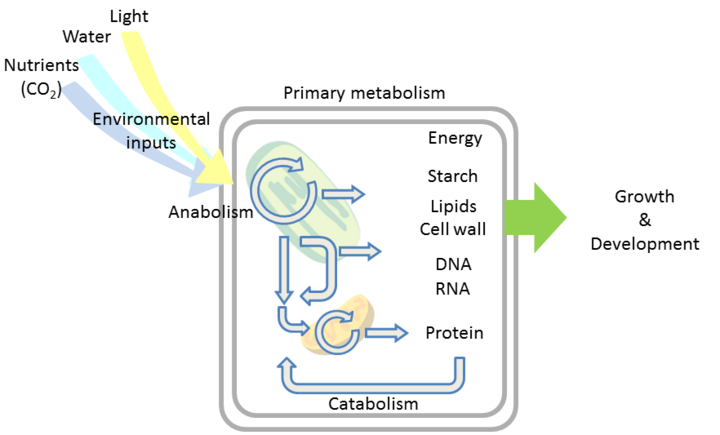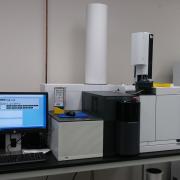Content
Research Interests
Plant cells are maintained by primary metabolism
Metabolism is the set of chemical reactions undergoing in living cells. Organisms are producing energy and building blocks required for their survival and development through reactions called “primary metabolism”. Photosynthesis and respiration composes important part of plant primary metabolism, by which plants gain energy and carbon backbone for the synthesis of over 200,000 plant derived chemicals. Plant primary metabolism is the major source of organic materials on the Earth and closely related to the environment, agriculture, industry and medicine.

Metabolic pathways are known but their regulation is largely unknown
Thanks to the research efforts by biochemists during 20th century, most of metabolic reactions related to the primary metabolism has been described. Genome sequence information allows us to draw virtually complete metabolic map in an organism. Thus the structure of the metabolic network is known. However, we know little about the regulation of primary metabolism in living systems largely due to the complex structure of metabolic network. Systematic approaches are required to understand the metabolic regulation. We study to address two key questions regarding the regulation of plant primary metabolism.
How does plant metabolism respond to environment?
Due to their sessile life style, plants need to acclimate to the changes of their surrounding environment by adjusting metabolic network. Number of metabolic responses have been shown to take place in response to environmental stimuli. For example, some plant species accumulate an amino acid, proline, to keep osmotic pressure of cellular compartments under water-limiting conditions. However, we can explain the rational for only few of these metabolic responses. We study to identify plant metabolic responses to sub-optimal growth conditions including abiotic stresses and to elucidate how these responses help plants to survive under stress.
How is plant metabolism regulated in the molecular level?
When plants actively regulate metabolic reactions, amounts and/or activities of enzymes needs to be modified. This can be achieved at transcriptional, translational and post-translational levels. Post-translational regulation of enzyme activity is ideal for a quick response since it does not accompany the time and resource demanding protein synthesis/degradation. We try to establish the roles of multi-enzyme complexes as a novel post-translational mechanism of metabolic regulation. A complex of enzymes mediating sequential metabolic reactions is called “metabolon”. Metabolon channel a metabolic intermediate from one enzyme to another and greatly reduce the diffusion distance. Therefore the formation of metabolon have many potential effects in the metabolic pathway activity and postulated as a mechanism of metabolic regulation. However, there is very limited experimental evidence of in vivo function of metabolon.
GC-MS based metabolomics and metabolic flux analysis
Metabolomics is an approach attempting to analyze whole set of metabolites in a biological system. We employ gas hromatography-mass spectrometry (GC-MS) for the systematic analysis of metabolites of primary metabolism including sugars, amino acids, organic acids, polyamines and some secondary metabolites. GC-MS is suitable for high-throughput metabolite analysis, allowing as to analyze large number of samples for genotyping and breeding samples. GC-MS is also a powerful tool for metabolic flux analysis by stable isotope labeling experiments to dissect metabolic pathway activities in living plants. We own a 7200 GC-QTOF system (Agilent) in our lab for these applications.
